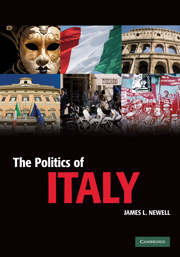Book contents
- Frontmatter
- Contents
- List of figures
- List of maps
- List of tables
- List of boxes
- Acknowledgements
- List of abbreviations
- Chronology
- Map 1 Italian regions and major cities
- Introduction
- I Historical background
- II The polity: structures and institutions of the regime
- III Politics: citizens, elites and interest mediation
- IV Policies and performances
- 8 Economic policy
- 9 Welfare and rights
- 10 Foreign policy
- Appendix: The electoral system for the Chamber of Deputies and the Senate
- References
- Index
10 - Foreign policy
Published online by Cambridge University Press: 05 August 2012
- Frontmatter
- Contents
- List of figures
- List of maps
- List of tables
- List of boxes
- Acknowledgements
- List of abbreviations
- Chronology
- Map 1 Italian regions and major cities
- Introduction
- I Historical background
- II The polity: structures and institutions of the regime
- III Politics: citizens, elites and interest mediation
- IV Policies and performances
- 8 Economic policy
- 9 Welfare and rights
- 10 Foreign policy
- Appendix: The electoral system for the Chamber of Deputies and the Senate
- References
- Index
Summary
Introduction
We began this book by placing the Italian polity in its temporal context; we finish by placing it in its spatial context, looking at foreign policy. The reason for doing this is simply that the Italian state, like any other, is not a self-contained, isolated, entity. Rather, along with other states, it is embedded in a system of social relations – the international state system – with profound implications for what goes on internally. As Jackson and Sørensen (2003: 1–9) point out, there are a series of values that the citizens of most states expect their governments to uphold, at least to some minimal degree. They include security, freedom, order, justice and welfare. States' success in upholding these values presupposes their membership of the international community of states: when cut off from that community, states' populations usually suffer as a consequence (Jackson and Sørensen, 2003: 1). It presupposes, too, states' success in managing the pressures and responsibilities that arise from membership of the international community: peace, and therefore the orderly conduct of international relations, is a prerequisite for the achievement of most if not all of the values.
An understanding of a country's position in the international state system and of the foreign-policy issues this gives rise to are therefore indispensable for an understanding of its politics and of how its governing institutions retain their authority.
- Type
- Chapter
- Information
- The Politics of ItalyGovernance in a Normal Country, pp. 318 - 351Publisher: Cambridge University PressPrint publication year: 2010

